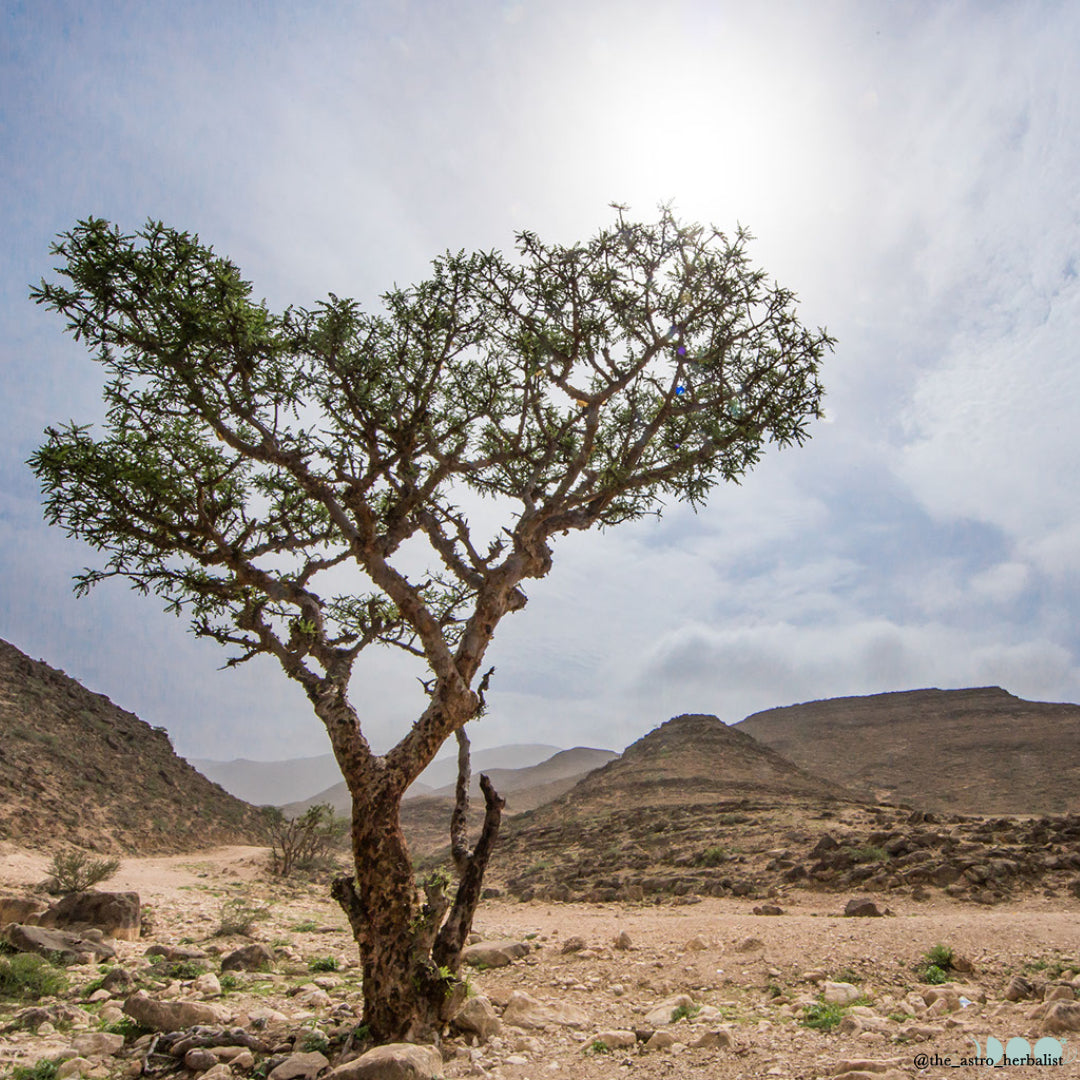It’s been awhile since I have posted anything here. I have been in the midst of a bit of writer's block and have been finding it hard to find the ambition to write about anything. Then I watched this video by Vice News and it got me all riled up and reminded me of one of the reasons I do what I do. (I also told off someone on FB today, so I must be in a mood…)
I highly recommend you watch this video. It is called “Inside the Wellness Industry’s Controversial Supply Chains” (link here). It focuses on doTERRA and the Frankincense trade, specifically on a shady middle-man that they purchase from. I believe it is safe to say that if one large “wellness” corporation is willing to ignore allegations like this, others definitely are as well. I am sure corruption exists across all “wellness” industries, but that is a much larger issue that I am not going to get into here today. (Support your local herbalists).
Multi-Level Marketers (MLMs) like doTERRA and Young Living create and nurture a cult-like following that ensures that their distributors and consumers will believe all the propaganda put out by the companies, disregard any second or third party investigations, and rely solely on the MLM for their education. This is true of many MLMs, not just the essential oil ones. The goal of the MLM is to make sure the people they sign on as distributors are 100% behind the product they are selling, so much so that they are willing to believe everything that the company tells them about it. I have had arguments in the past with MLM essential oil distributors about safely using oils, something the MLMs don’t seem to care much about (…ahem, ingestion, ahem…). These conversations didn’t go well. I have several certifications under my belt, but none of them were given by an MLM, so they don’t believe me. Many actually believe that the certification programs are the ones doing the brainwashing, not the MLMs. I have given up on these types of conversations. Pro-tip: don’t solely take lessons from the people trying to sell you the product they are teaching you about.
The Vice video focuses on one specific plant product purchased by one specific company from one specific middle-man, so it is by no means a full picture of the industry. It does however open some uncomfortable doors, and bring up some uncomfortable questions that everyone who works in “wellness” (I dislike that term, hence the parenthesis), or purchases from people in this industry should pay attention to. The “wellness” industry encompasses everything from essential oils, herbs and supplements, to massage, nutrition and life coaching. Most people who work in this industry are well intentioned, but many are also just trying to make a quick buck in a quickly growing global market.
The video states that harvesters in Somaliland sell their Frankincense harvest for $3-$5 a kg to a middle-man who then sells it to larger companies (2). The harvesters sell the oil “on loan” with the promise of payment at a later date, which the video states they rarely actually receive (2). The larger companies then sell the oil they produce at a massive markup, and the harvesters do not see any of it. Whether it is the fault of the MLMs or the middle-men they purchase from can be up for debate, but it is obvious that these harvesters are not getting the monetary compensation that they deserve.
It takes about 0.23 kg of resin to make one 15 ml bottle of essential oil (2), or about 6% of one of the kilograms that the harvester is selling. DoTERRA then sells a 15 ml bottle of Frankincense oil for $122.67 retail or $92 wholesale (7). Young Living’s prices are even higher at $132.89 retail and $101 wholesale (6). Wholesale means that if you sign up to be a distributor, you can purchase for the lower price. “Lower” is a relative term here, as these MLM companies mark up their products by insanely high amounts, claiming it is because they are the purest on the market. “Seed to Seal'', “Therapeutic Grade” or “CPTG Certified Pure Tested Grade” are labels they use as a way to make the consumer believe that their oils are superior in quality to other oils. Here’s something they don’t want consumers to realize: there is no governing body for essential oils. These labels that these companies have on their oils are labels that they have made up and given to themselves. They mean nothing in the global marketplace. They are just buzz words designed to manipulate the consumer (and distributor) into purchasing their overpriced oils instead of more reasonably priced oils from much more ethical companies. A distributor is also required to spend a certain amount of money a month on the company's products to continue to qualify for these “lower” prices, so who is really winning here?
Let's compare Frankincense prices from a couple different essential oil sellers. These are the prices in CDN$ for a 15 ml bottle:
Young Living: $101.00
doTerra: $122.67
New Directions Aromatics: $4.19 (organic)
Aromatics International: $53.00 (organic)
Rae Dunphy: $30.99 (this is for 12 ml, they do not have a 15 ml option)
Desrosiers International: $37.32
Definitely looks like it’s worth shopping around…
So, if the allegations put forward in the Vice video are true, doTERRA is purchasing Frankincense resin from a middle-man in Somaliland, who is not paying the harvesters a fair price, if he pays them anything at all. DoTERRA then marks up the price of Frankincense essential oil substantially to sell to unwitting consumers, while turning a blind eye to harvesting tactics and possibly protecting their corrupt, rapist, middle-men while they do it. The global market for Frankincense essential oil is projected to reach $406.1 million USD by 2028 (12). How much of that money do you think these harvesters will see? How much more ecological damage do you think will happen in order to reach that target? How many more women raped?
I think it is safe to assume that other large “wellness” companies are no better. In 2017 Young Living pleaded guilty to “federal misdemeanor charges regarding its illegal trafficking of rosewood oil and spikenard oil in violation of the Lacey Act and the Endangered Species Act.” (1)They were sentenced to pay “$760,000 in Fines, Forfeiture, and Community Service, and to Implement a Comprehensive Compliance Plan.” (1) Their website now boasts about this compliance plan being the only one of its kind in the industry…(6) According to Young Living, this illegal harvesting and importation of Rosewood and Spikenard was done without their knowledge, carried out by “certain employees'' over a period of 4 years, from 2010-2014.(1) Young Living says that they chose to voluntarily disclose the discrepancy and that they decided to “conduct an internal investigation, voluntarily disclose the initial violations to government enforcement authorities, and cooperate throughout the ensuing investigation.”(1) It is great that they “voluntarily” brought this to light, and cooperated during the investigation, but why did they? I can’t help but wonder if they knew this had been going on the whole time and chose to ignore it for as long as they could. The Vice video sure makes it seem like that is exactly what doTERRA is doing in regards to their Frankincense purchases. It is interesting to note that Young Living does not carry Rosewood or Spikenard essential oils anymore, but doTERRA does carry Spikenard, claiming “By sourcing Spikenard oil from Nepal, doTERRA is able to support much needed income streams for harvesters and partner distillers, particularly in the remote areas where it is harvested, as well as support needed rural community development projects through our Co-Impact Sourcing® initiatives.”(4) (The cynic in me needs to insert an eyeroll here.)
This lawsuit is a big deal because Rosewood (Aniba rosaeodora) and Spikenard (Nardostachys jatamansi) are both on the IUCN red list of endangered species. Trade goods that are on the red list require special CITES permits for import and export which is what got Young Living into trouble; they did not have any of the required permits making their importation of Rosewood and Spikenard illegal. CITES stands for the Convention on International Trade in Endangered Species. CITES was created in 1963 as a way to help regulate the wildlife trade (meaning both plants and animals) for conservation purposes. CITES was created by the IUCN and the two bodies work together to insure the protection of endangered “flora and fauna.”(13)
As of 2020, the IUCN lists Rosewood as endangered and Spikenard as critically endangered(3). As a side note, two different species, Aniba rosaeodora and Dalbergia nigra, are both referred to as Brazilian Rosewood making researching the oils a bit confusing, but both species are on the IUCN red list and both require CITES permits to import and export. The specific oil named in the Young Living Lawsuit is Aniba rosaeodora(1).
In the production of Spikenard essential oil, it is the root that is used. To harvest a root typically means the whole plant is pulled up. Rosewood is no better. The entire tree is cut down and floated to a distillery. This type of wild harvesting is unsustainable, which is why both of these plants are on the red list. Humanity is greedy. I encourage you to check out the IUCN list (link here), the CITES list (link here) and the UpS (United Plant Savers) species at risk list (link here) to get a better understanding of just how bad this is becoming, not just with Rosewood and Spikenard, but with several plants species that are used in the “wellness” industry.
Here are a few more links worth reading if you want to dive in a bit deeper:
-
Somaliland: DoTERRA and Local Partner Asli Maydi Impact Environment Negatively through Over-tapping Frankincense Trees. https://somalilandsun.com/somaliland-doterra-and-local-partner-asli-maydi-impact-environment-negatively-through-over-tapping-frankincense-trees/
-
I was raped working as a scientist in the essential oil industry. Local women endure much worse. https://www.lioness.co/post/i-was-raped-working-as-a-scientist-in-the-essential-oil-industry-local-women-endure-much-worse
- CNN documentary on Somaliland and Frankincense. https://www.anjanettedecarlo.com/post/cnn-documentary-on-somaliland-frankincense
-
The Rosewood Trade: An Illicit Trail from Forest to Furniture. https://e360.yale.edu/features/the-rosewood-trade-the-illicit-trail-from-forest-to-furniture
-
Succeeding with CITES: New project aims to promote sustainable wild Jatamansi trade from Nepal. https://www.traffic.org/news/succeeding-with-cites-new-project-aims-to- promote-sustainable-wild-jatamansi-trade-from-nepal/
I would like to close by saying that this is not a commentary on the quality of the essential oils that these companies produce, but on their shady business practices and their seeming willingness to profit off of marginalized harvesters, endangered plants and gullible consumers. Do your research before you buy, and do not take everything at face value. Large companies will say one thing to your face while secretly doing the opposite behind your back. Support local, support small scale, support the farmers/harvesters, and above all else, ask yourself “do I actually need to purchase this?”
And please for the love of everything, please stop using Frankincense oil to clean your house!
Sources:
- https://www.justice.gov/opa/pr/essential-oils-company-sentenced-lacey-act-and-endangered-species-act-violations-pay-760000
- https://www.youtube.com/watch?app=desktop&fbclid=IwAR1S3bcAxYAvhkOk6fteu3U_7REtHKqNrCvlXlb07qRjDvrOjBIHkv9Zrtc&v=5wEJvx_L0Ok&feature=youtu.be
- https://www.iucnredlist.org/
- https://www.doterra.com/US/en/p/spikenard-oil
- https://www.canada.ca/content/dam/eccc/migration/main/cites/9e21fdbf-3f22-4caa-9417-c656c9dbedab/rosewoods-en.pdf
- https://www.youngliving.com/en_CA/
- https://www.doterra.com/CA/en
- https://www.desrosiersinternational.com/product-page/fantastic-4-frankincense-oil
- https://www.newdirectionsaromatics.ca/products/essential-oils/frankincense-organic-essential-oil.html
- https://www.aromatics.com/
- https://www.desrosiersinternational.com/product-page/fantastic-4-frankincense-oil
- https://apnews.com/article/technology-business-virus-outbreak-corporate-news-diseases-and-conditions-9e3449b1a1d5f0109281ef6825079b35
- https://cites.org/eng/disc/what.php
- https://unitedplantsavers.org/species-at-risk-list/

